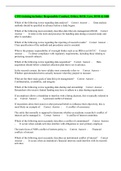Citi training includes - Study guides, Class notes & Summaries
Looking for the best study guides, study notes and summaries about Citi training includes? On this page you'll find 84 study documents about Citi training includes.
All 84 results
Sort by
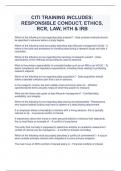
-
CITI TRAINING INCLUDES: RESPONSIBLE CONDUCT, ETHICS, RCR, LAW, HTH & IRB
- Exam (elaborations) • 40 pages • 2023
-
- $9.99
- + learn more
CITI TRAINING INCLUDES: RESPONSIBLE CONDUCT, ETHICS, RCR, LAW, HTH & IRB Which of the following is true regarding data analysis? Which of the following most accurately describes data lifecycle management (DLM) Which of the following is true regarding the reporting of research results? What is the primary responsibility of oversight bodies such as an IRB or an IACUC Which of the following is true regarding data acquisition? In the research context, the term validity most comm...
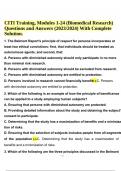
-
CITI Training, Modules 1-24 (Biomedical Research) Questions and Answers (2023/2024) With Complete Solution.
- Exam (elaborations) • 71 pages • 2023
-
- $12.99
- 1x sold
- + learn more
CITI Training, Modules 1-24 (Biomedical Research) Questions and Answers (2023/2024) With Complete Solution. 1. The Belmont Report's principle of respect for persons incorporates at least two ethical convictions: first, that individuals should be treated as autonomous agents, and second, that: A. Persons with diminished autonomy should only participate in no more than minimal risk research. B. Persons with diminished autonomy should be excluded from research. C. Persons with diminished au...
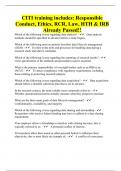
-
CITI training includes: Responsible Conduct, Ethics, RCR, Law, HTH & IRB Already Passed!!
- Exam (elaborations) • 48 pages • 2023
-
- $12.49
- + learn more
Which of the following is true regarding data analysis? - Data analysis methods should be specified in advance before a study begins. Which of the following most accurately describes data lifecycle management (DLM) - It refers to the tools and processes for handling data during a research study and after it concludes. Which of the following is true regarding the reporting of research results? - Clear specification of the methods and procedures used is essential. What is the pri...
CITI training includes: Responsible Conduct, Ethics, RCR, Law, HTH & IRB
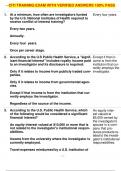
-
CITI TRAINING EXAM WITH VERIFIED ANSWERS 100% PASS
- Exam (elaborations) • 33 pages • 2024
-
- $8.89
- + learn more
CITI TRAINING EXAM WITH VERIFIED ANSWERS 100% PASS 1. At a minimum, how often are investigators funded by the U.S. National Institutes of Health required to receive conflict of interest training? Every two years. Annually. Every four years. Once per career stage. 2. According to the U.S Public Health Service, a "signif- icant financial interest" includes royalty income paid to an investigator and its disclosure is required: Only if it relates to income from publicly traded com- pan...
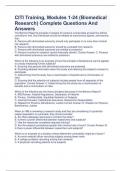
-
CITI Training, Modules 1-24 (Biomedical Research) Complete Questions And Answers
- Exam (elaborations) • 30 pages • 2023
-
Available in package deal
-
- $14.99
- + learn more
CITI Training, Modules 1-24 (Biomedical Research) Complete Questions And Answers The Belmont Report's principle of respect for persons incorporates at least two ethical convictions: first, that individuals should be treated as autonomous agents, and second, that: A. Persons with diminished autonomy should only participate in no more than minimal risk research. B. Persons with diminished autonomy should be excluded from research. C. Persons with diminished autonomy are entitled to protection...
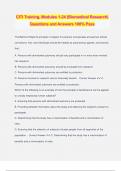
-
CITI Training, Modules 1-24 (Biomedical Research) Questions and Answers 100% Pass
- Exam (elaborations) • 54 pages • 2024
- Available in package deal
-
- $13.49
- + learn more
CITI Training, Modules 1-24 (Biomedical Research) Questions and Answers 100% Pass The Belmont Report's principle of respect for persons incorporates at least two ethical convictions: first, that individuals should be treated as autonomous agents, and second, that: A. Persons with diminished autonomy should only participate in no more than minimal risk research. B. Persons with diminished autonomy should be excluded from research. C. Persons with diminished autonomy are entitled to prote...
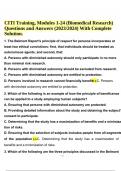
-
CITI Training, Modules 1-24 (Biomedical Research) Questions and Answers (2023/2024) With Complete Solution.
- Exam (elaborations) • 71 pages • 2023
-
- $12.99
- + learn more
CITI Training, Modules 1-24 (Biomedical Research) Questions and Answers (2023/2024) With Complete Solution. 1. The Belmont Report's principle of respect for persons incorporates at least two ethical convictions: first, that individuals should be treated as autonomous agents, and second, that: A. Persons with diminished autonomy should only participate in no more than minimal risk research. B. Persons with diminished autonomy should be excluded from research. C. Persons with diminished au...
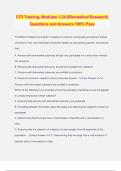
-
CITI Training, Modules 1-24 (Biomedical Research) Questions and Answers 100% Pass
- Exam (elaborations) • 54 pages • 2024
-
- $13.49
- + learn more
CITI Training, Modules 1-24 (Biomedical Research) Questions and Answers 100% Pass The Belmont Report's principle of respect for persons incorporates at least two ethical convictions: first, that individuals should be treated as autonomous agents, and second, that: A. Persons with diminished autonomy should only participate in no more than minimal risk research. B. Persons with diminished autonomy should be excluded from research. C. Persons with diminished autonomy are entitled to prote...
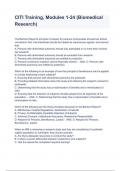
-
CITI Training, Modules 1-24 (Biomedical Research)
- Exam (elaborations) • 31 pages • 2023
- Available in package deal
-
- $13.49
- + learn more
CITI Training, Modules 1-24 (Biomedical Research) The Belmont Report's principle of respect for persons incorporates at least two ethical convictions: first, that individuals should be treated as autonomous agents, and second, that: A. Persons with diminished autonomy should only participate in no more than minimal risk research. B. Persons with diminished autonomy should be excluded from research. C. Persons with diminished autonomy are entitled to protection. D. Persons involved in resear...

$6.50 for your textbook summary multiplied by 100 fellow students... Do the math: that's a lot of money! Don't be a thief of your own wallet and start uploading yours now. Discover all about earning on Stuvia

